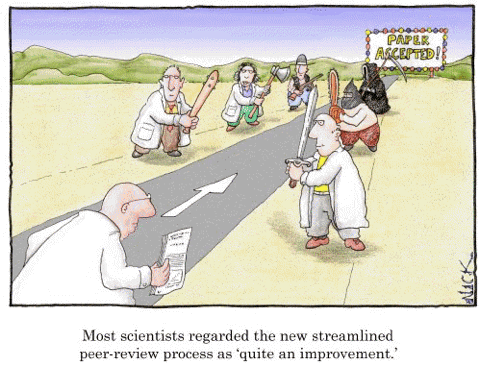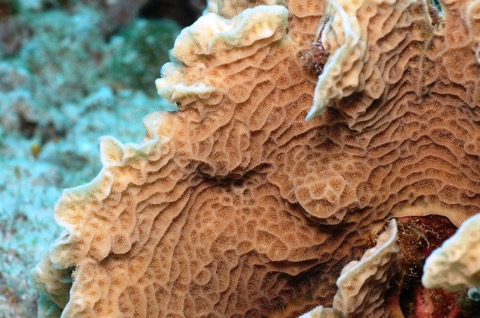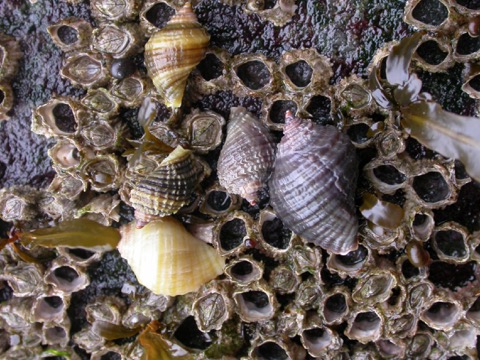pubs
Open Access
20/11/13 10:02
I’ve got a thing in the back of my mind now that it is time to change how I submit manuscripts. There is a growing pressure to consider submission of pre-prints, with the most complete arguments I’ve read being made by John Bruno and Jon Wilkins, two scientists I respect for far more than their names. I have little interest in adding another step to the process of making my science publicly known via publishing. However, there are some factors where pre-publication, in appropriate online archives including PeerJ and bioRxiv, certainly makes sense.
The cost of publishing science has never been negligible, but now that we are asked (and it makes sense) to publish in open-access journals so that all citizens of the nations that fund our work can read it, we are often faced with $1500-2000 fees to publish in permanent ways on online servers. However, some (not all) journals will allow you to publish after submitting a version of a manuscript to a pre-print server, and then will allow you to archive the final version on that publicly-accessible server after a short period of time. This could cut the cost of open access considerably.
It also makes sense to me that this could be a ripe opportunity to gain additional input into appropriate analysis and interpretation of data, beyond the typical friendly peer review we all go through. I’m skeptical on this point, as I don’t think my publications on open access journals such as PLoS ONE have garnered much comment in the years they have been up. However, it is possible.
The question will be, and I will test the waters soon, what is requested or required for submission? It doesn’t have to go through peer review, but what formatting and other steps are necessary? How many of these steps are ultimately necessary for publication anyway (and thus just egg along the process)?
The other problem of course is the potential for further dilution of what is branded ‘peer-reviewed’ science. John Bruno, linked above, makes some good arguments that the peer-review system is deeply flawed, and it is. However, it is the only gatekeeper we have when those that are trying to sow doubt about evolution and climate change attempt to fraudulently influence the public understanding. A difficult tension between the two goals: widespread dissemination, and authority. Hmmmm.

The cost of publishing science has never been negligible, but now that we are asked (and it makes sense) to publish in open-access journals so that all citizens of the nations that fund our work can read it, we are often faced with $1500-2000 fees to publish in permanent ways on online servers. However, some (not all) journals will allow you to publish after submitting a version of a manuscript to a pre-print server, and then will allow you to archive the final version on that publicly-accessible server after a short period of time. This could cut the cost of open access considerably.
It also makes sense to me that this could be a ripe opportunity to gain additional input into appropriate analysis and interpretation of data, beyond the typical friendly peer review we all go through. I’m skeptical on this point, as I don’t think my publications on open access journals such as PLoS ONE have garnered much comment in the years they have been up. However, it is possible.
The question will be, and I will test the waters soon, what is requested or required for submission? It doesn’t have to go through peer review, but what formatting and other steps are necessary? How many of these steps are ultimately necessary for publication anyway (and thus just egg along the process)?
The other problem of course is the potential for further dilution of what is branded ‘peer-reviewed’ science. John Bruno, linked above, makes some good arguments that the peer-review system is deeply flawed, and it is. However, it is the only gatekeeper we have when those that are trying to sow doubt about evolution and climate change attempt to fraudulently influence the public understanding. A difficult tension between the two goals: widespread dissemination, and authority. Hmmmm.

More Shouts
19/10/12 09:39
It’s been a good week for the Wares Lab. Christine Ewers passed her oral examinations on Tuesday and is now a Ph.D. candidate; her fortune came through wildly the next day when she found out that - having entered one of the numerous drawings that they hold at product shows - she won an $8000ish ABI thermal cycler! We haven’t figured out the details on this prize yet but obviously a pretty exciting win.

Also, doctoral student Meredith Meyers just (probably) landed her second publication in the last two months as she just got word from Journal of Heredity that only very minor revisions are necessary for her paper on fluorescent protein sequence evolution in the coral genus Agaricia. This is exciting not just because it is a publication, but this was the most technically punishing paper that she and I have had to work on and it touches on the boundaries of what we know as molecular evolution folk. When there are multiple copies of a gene in a group of organisms (and I suppose it is also possible that those species are hybridizing!), that means that the variation that is present in what we can survey represents allelic variation at a locus, the divergence of gene copies, and the divergence of gene copies in different species. Unfortunately, it is very difficult to tell where to draw the lines between these different ‘containers’ of diversity, but Meredith did a very good job examining the problem and I’ll post publication details when they are available.
Finally, long-time Wares Lab associate Jamie Winternitz (Altizer Lab, Odum School of Ecology) defends her dissertation today. Fantastic, difficult work on the interaction of immune system evolution and parasite load in montane voles. Looking forward to hoisting a beer in her honor later today.
You should be nervous for us. Please note the number of chickens I’ve counted before they’ve hatched in this post!

Also, doctoral student Meredith Meyers just (probably) landed her second publication in the last two months as she just got word from Journal of Heredity that only very minor revisions are necessary for her paper on fluorescent protein sequence evolution in the coral genus Agaricia. This is exciting not just because it is a publication, but this was the most technically punishing paper that she and I have had to work on and it touches on the boundaries of what we know as molecular evolution folk. When there are multiple copies of a gene in a group of organisms (and I suppose it is also possible that those species are hybridizing!), that means that the variation that is present in what we can survey represents allelic variation at a locus, the divergence of gene copies, and the divergence of gene copies in different species. Unfortunately, it is very difficult to tell where to draw the lines between these different ‘containers’ of diversity, but Meredith did a very good job examining the problem and I’ll post publication details when they are available.
Finally, long-time Wares Lab associate Jamie Winternitz (Altizer Lab, Odum School of Ecology) defends her dissertation today. Fantastic, difficult work on the interaction of immune system evolution and parasite load in montane voles. Looking forward to hoisting a beer in her honor later today.
You should be nervous for us. Please note the number of chickens I’ve counted before they’ve hatched in this post!
North Atlantic
07/10/10 10:46
It’s funny, I made my start as a population geneticist championing the cause of the North Atlantic Ocean, and I don’t think about it as often these days. Our careers creep in many funny directions, sometimes pulled by funding opportunities and sometimes by fortuitous collaboration.

The above image was snared from the website of Geoff Trussell’s lab at Northeastern University. Geoff is one of my many great colleagues that I know from interactions at the CORONA meetings and every year that I can make it to the Benthic meetings on the east coast (and really, who would want to miss these meetings? Nice one, Jeremy...). Anyway, the image is primarily of the dogwhelk, Nucella lapillus. A really beautiful snail, lots of color variation, interesting genetic patterns, part of my dissertation.
The work is finally being updated, with modern statistical (ABC) approaches, by my good friend and colleague Mike Hickerson and his student and postdoc (particularly lead author Katriina Ilves). The results are clearly starting to change. There are taxonomic controls on who survived glaciation and who didn’t - on the east coast of North America, at least - rather than larval life history controls, if the statistics tell the whole story. What is amazing is how big of an impact that paper had in 2001, and I suspect this paper will have a big impact in 2010.... and yet we still clearly know so little. Most of these species have still only been assayed for mitochondrial variation. The time will come soon when we can apply for funding to tackle the same community using variation across the entire genome.

The above image was snared from the website of Geoff Trussell’s lab at Northeastern University. Geoff is one of my many great colleagues that I know from interactions at the CORONA meetings and every year that I can make it to the Benthic meetings on the east coast (and really, who would want to miss these meetings? Nice one, Jeremy...). Anyway, the image is primarily of the dogwhelk, Nucella lapillus. A really beautiful snail, lots of color variation, interesting genetic patterns, part of my dissertation.
The work is finally being updated, with modern statistical (ABC) approaches, by my good friend and colleague Mike Hickerson and his student and postdoc (particularly lead author Katriina Ilves). The results are clearly starting to change. There are taxonomic controls on who survived glaciation and who didn’t - on the east coast of North America, at least - rather than larval life history controls, if the statistics tell the whole story. What is amazing is how big of an impact that paper had in 2001, and I suspect this paper will have a big impact in 2010.... and yet we still clearly know so little. Most of these species have still only been assayed for mitochondrial variation. The time will come soon when we can apply for funding to tackle the same community using variation across the entire genome.
The First!
13/01/10 12:17
It has been a good 5 years for the Wares Lab. We’ve had 2 Honors students, 2 Ph.D.’s, and at least 6 other undergraduates finish up in that time, and a number of good publications, small grants, projects started and completed. But today in the mail I received a copy of MEPS, and I was confused as to why they were sending me a paper copy until I realized: the first paper published by one of my graduate students finally hit the printed form! It is also the first paper for one of the Honors students (the one holding the box knife in my previous post); we do have online publications (to be in print soon) for the other Honors student (Clare Scott), two for one of the other grads, and one for a finished Ph.D. (hopefully with many more to come, Scott!), but seeing the paper in black-and-white: nothing like it. Congratulations Christina and John!